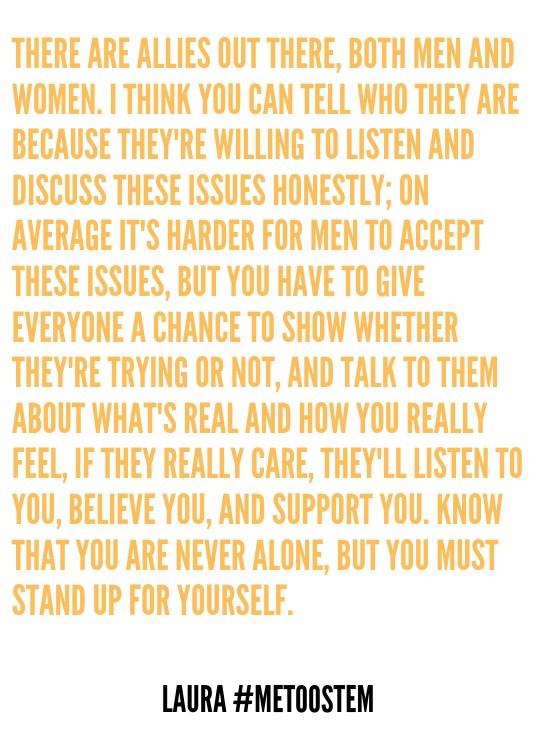My name is not Laura.
My Worst Moment: I have been propositioned on multiple occasions by men who “mistook” my eagerness to discuss professional matters for sexual interest. Rejection of these invitations has been received with varied levels of insinuation or direct accusation that this is my fault for putting myself in front of the man in the first place. Now that I’m more experienced I can identify and pre-empt these situations more effectively, but that also means that the ones who get through are the real SOB’s who go lower than I could anticipate. One action I could take to avoid this type of stressful situation is to not approach men directly, obviously that is bad for my career, but I still am much more aloof than I used to be. I know these are common experiences for professional women, and it’s continually frustrating.

Laura has been propositioned by multiple men in her field, one of whom (a distinguished professor) tried to kiss her. Laura declined to provide a photo. Photo originally posted by [email protected]
The second worst was being cornered by the man in charge of an unfamiliar (to me) field operation, into a very awkward sexual proposition where I couldn’t defend myself without making a scene. I needed this man’s help to complete the work that I’d traveled there to do. It was gross but I squirmed away. I was fortunate to find confidence to shame the man in question (with meaningful support of one of the people who saw it happen), and surprisingly fortunate that this guy was impressed that I had the lady-parts to put him in his place and pseudo-apologized! We all continued working together successfully on a small ongoing project there. But after he retired recently, the relief of not having to banter with that guy was a massive weight lifted.
The worst started early in graduate school, when I was so flattered that a distinguished professor took an interest in my work and career. My major advisor smiled and said “he’s a very supportive man”. We checked in at bi-annual meetings over beers, drinking/networking is normal for our field, but at the end of one evening he tried to kiss me. I backed off and left alone to my hotel. He apologized the next day and said something along the lines of “we were so good to not go through with it”. I thought: Um, *you* would have happily gone through with it if I hadn’t walked away; but I did not say this to him. Within the next few months he invited me to a special long-range planning workshop, and I accepted, my major advisor supported this great networking opportunity. I arrived to find that I was one of only 2 graduate students there, the other was local, and neither he nor I could figure out what our role was. Socializing with the group at the hotel after the workshop, it was even more clear that nobody knew why I was there except that this senior organizer valued my presence for some reason, and even though we never did anything sexual, people were clearly wondering about it, and he was happy to let them wonder. It was humiliating. After that I stopped talking to him at meetings unless it was a clearly formal interaction, though I did intercept him creeping on other girls a couple times during the informal networking periods, because I finally saw his targeted pattern of being “supportive” of the insecure female graduate students at the meetings. I am still so ashamed of myself for being that girl.
In the latter case, I was fortunate that other senior professors in that group were capable of supporting my and other students’ work without trying to sleep with us, that helped me maintain some professional self-confidence. I still can’t help but wonder when I interact professionally with any man whether he’s actually listening to me or he’s hoping I’ll eventually trip and fall on his dick, and it’s so unfortunate because I know there are plenty of guys who aren’t active creeps, but there are enough (more than 2, that’s for sure) that I am very cautious with any new contact. This is also the sort of behavior that passes with everybody, as long as it doesn’t become a “problem”. Except it is a problem, just not a public problem! Over a decade later, I’m an Assistant Professor now, still in the same field (one of few females who didn’t drop out), and I do interact with the “nice” creep professor regularly, and he still tells me things about myself that he made up, he has contrived a mythology about our past that does not match my experience. This is called gaslighting, y’all! It also means he’s convincing himself to believe something so he won’t technically be lying if anyone asks. I will not go along with it, and I confront him directly often enough that I’ve seen the cracks in this fantasy, he shows guilt/remorse occasionally, but only to me, and it is a seriously exhausting psychological microbattle. He never did anything illegal - definitely too smart for that. His work itself was good, too, there is reason for him to be “distinguished” and making this a public issue could affect the reputation of our sub-field. Beyond the important fact that I actually care about the work that I (and we all) do, I am optimistic that people will have my back moving forward professionally, but I fear not if I move to tank this guy personally. So as far as I can tell it’s a matter of waiting for him to retire before I can be free of this. I am significantly younger and I will outlast him.

I Have Given Up On: I have let certain promising papers and projects fall to the wayside because I don’t want to collaborate with that worst man, or let him have any credit for any success that I can earn.
I Am Afraid: I know it can be so much worse, it is painful to hear other women’s experiences of physical harassment and antagonistic retaliation. I am afraid that if I make a bigger deal out of my experiences I will lose more time and reputation, or feed the backlash by accusing a “nice” distinguished professor of actually being a predatory narcissist. I am afraid that if I am too complacent, that the culture of acceptance of this behavior will grow and worse things will happen.
This Has Cost Me: Beyond specific dropped projects related to avoiding specific individuals, the consequent self-doubt, anxiety and depression has cost me substantial amounts of time and productivity over the years, quantifying losses impossible. Some days, anger saps my mental energy, and some days motivation is extremely difficult to rouse.
Something You Should Know About Me: I’m shy and introverted to begin with, I can’t help but wonder if this makes me seem more vulnerable when I work up the motivation to talk to somebody: but I know it’s not my fault no matter who tries to tell me so! I believe in myself and I’m proud that I have not quit, despite these men. I pride myself in my work, and I enjoy my work, I can’t quit that. I do show my anger when people try to use me, calling people (usually men - maybe because they are most commonly in the position to take advantage of people) out on their bad behavior, and that meets frequent resistance, and I am very frustrated that I can’t see an immediate path to change.
Is There a Bright Side: When I was younger, I never trusted guys my own age, but I did trust older men who were my teachers and mentors (and I did have wonderful male role models growing up). These issues began after entering academia professionally, and the worst ones noted are directly related to men manipulating power differentials and seeking the admiration of younger women to promote their status and ego. As I’ve gotten older I find more allies in men and women my age: Colleagues at the same level building our professional careers with (not on the backs of) our peers, and colleagues concerned for the independent success of their students, both male and female. I have hope for the future.
My Fight Song: There is no one song that covers it. I have an “it’s OK to be angry” playlist and a “keep dreaming” playlist that I alternate between.
Secret Weapon: There are allies out there, both men and women. I think you can tell who they are because they’re willing to listen and discuss these issues honestly; on average it’s harder for men to accept these issues, but you have to give everyone a chance to show whether they’re trying or not, and talk to them about what’s real and how you really feel, if they really care, they’ll listen to you, believe you, and support you. Know that you are never alone, but you must stand up for yourself.